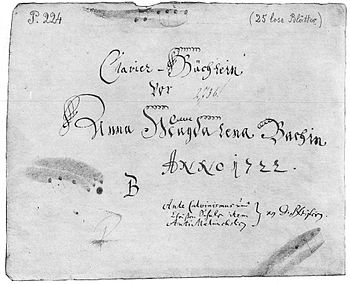BAROQUE AND EARLY MUSIC
WORKING MUSICIANS
The churches in the Baroque Era used grandiose music that suited the styles of composers like Bach very well. You can read more in the text on page 133 about the use of Baroque music in church. Churches needed music not only for worship services, but also for ceremonies (ex. ordination, weddings, funerals). Because of the great need for large amounts of music (and remember, they couldn't just pop in a CD for worship), the role of the music director was extremely important.
A music director like Bach or Monteverdi not only wrote music for each service, but also trained musicians, directed musical ensembles, did their own copy work (copying of scores for the musicians), and kept visiting dignitaries happy with exciting new works through commissions. Some Baroque church music directors were fortunate enough to have assistants help with the copy work. Sometimes a score was not completed entirely. For example, Bach often created shorthand versions of his scores and improvised off of them on the organ. As a composer, I know from experience, that often what is improvised is much better than what is written down. For this reason, many musicians who perform Baroque music today embellish on the score and do not play what is strictly written on the page.
 COMPOSER BACH
COMPOSER BACH
The
Bach family was reknown for their musical talent. Several of Johann
Sebastian Bach's children continued on to studey music and become
successful composers of thier own. Johann Christian Bach and Carl Philip
Emmanuel Bach become the best known of J.S. Bach's children. They had
successful professional and musical lives during the end of the Baroque
Era (called the Rococo Period). The Rococo period had a lighter musical
feel, and preceding the clean and melodic classicism soon to come with
the Age of Enlightenment. What is interesting about Bach's fame today is that shortly after his death, Bach had disappeared from the music scene. In fact, it was not until the 1800s that Bach was rediscovered by the composer Felix Mendelssohn. In fact, Mendelssohn created a revival of Baroque music by presenting Bach's music like St. Matthew's Passion. If it was not for Mendelssohn, we might have never heard about J.S. Bach!
| Frontispiece of Bach's Clavier-Büchlein vor Anna Magdalena Bach, composed in 1722 for his second wife (Photo credit: Wikipedia) |
Think about choir directors that you have known (ex. church choral directors, community choirs, high school choir directors), especially those who contributed to the choir by writing/arranging music or by performing. Do you think any of them might have been a closet Bach, drudging away at their job?















Comments